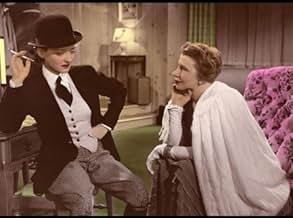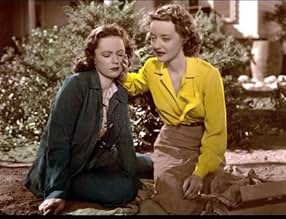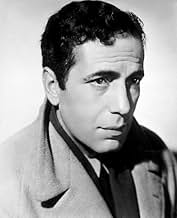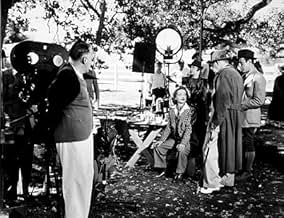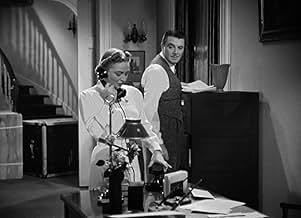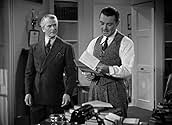NOTE IMDb
7,4/10
13 k
MA NOTE
Ajouter une intrigue dans votre langueA young socialite is diagnosed with an inoperable brain tumor, and must decide whether or not she'll meet her final days with dignity.A young socialite is diagnosed with an inoperable brain tumor, and must decide whether or not she'll meet her final days with dignity.A young socialite is diagnosed with an inoperable brain tumor, and must decide whether or not she'll meet her final days with dignity.
- Réalisation
- Scénario
- Casting principal
- Nommé pour 3 Oscars
- 5 victoires et 4 nominations au total
Black Ace
- Judith's Horse
- (non crédité)
Marian Alden
- Judith's Friend
- (non crédité)
Wilda Bennett
- Judith's Friend
- (non crédité)
Diane Bernard
- Lucy - a Servant
- (non crédité)
Avis à la une
When Bette Davis was in ball buster mode, watch out!! But when she decided to suffer nobly, she could suffer with the best of them.
In "Dark Victory," Davis plays a woman dying from the deadliest of deadly diseases---the vague, unnamed illness that beautiful actresses died of in movies from the 1930s. The symptoms never seem to be the same, but they're always tear-inducing. Here, they make Davis go blind and we know when the disease is getting worse because a fuzzy black halo begins to appear around the edges of the frame.
Actually, this movie is a rather pale companion to the ultimate Davis melodrama, "Now, Voyager." But it has perhaps my favorite line ever delivered in a Bette Davis movie. She's found out that her illness is fatal, and she's at dinner with the doctor who has kept this from her to protect her fragile soul. When the waiter comes to take her order, she says, "How about a nice big helping of..." pause, as she throws the most withering of withering stares at her companion ..."prognosis negative." That should really be on a bumper sticker somewhere.
As for the other actors.....wait, other actors? No one watches a Bette Davis movie to see other actors. I'm not even sure there were any other actors in this movie.
Grade: B
In "Dark Victory," Davis plays a woman dying from the deadliest of deadly diseases---the vague, unnamed illness that beautiful actresses died of in movies from the 1930s. The symptoms never seem to be the same, but they're always tear-inducing. Here, they make Davis go blind and we know when the disease is getting worse because a fuzzy black halo begins to appear around the edges of the frame.
Actually, this movie is a rather pale companion to the ultimate Davis melodrama, "Now, Voyager." But it has perhaps my favorite line ever delivered in a Bette Davis movie. She's found out that her illness is fatal, and she's at dinner with the doctor who has kept this from her to protect her fragile soul. When the waiter comes to take her order, she says, "How about a nice big helping of..." pause, as she throws the most withering of withering stares at her companion ..."prognosis negative." That should really be on a bumper sticker somewhere.
As for the other actors.....wait, other actors? No one watches a Bette Davis movie to see other actors. I'm not even sure there were any other actors in this movie.
Grade: B
It's easy to see why Bette Davis admired "Dark Victory" more so than any of her other star-vehicles--her Judith Traherne is the quintessential Bette Davis character: smart, sassy, nervously gay, a drinking pal to the guys and a best buddy to the girls. Traherne is without malice, a real chum, and Davis plays her with fluttery vitriol and upper-crust glee. Long Island society girl, ailing but still strong, falls wildly in love with her doctor...but how can he tell her that she has very little time left to live? The supporting cast is made up of some odd personalities: Geraldine Fitzgerald's dedicated girlfriend seems to have no life outside of Judith's world (and performs her gal-pal duties with a curious severity); Humphrey Bogart is an Irish stable-hand with a secret crush on Judith (she's tempted, but ultimately conveys to him the old 'don't touch' message); Ronald Reagan is a country club type, always in a tuxedo and at the bar; George Brent is the brilliant surgeon who loves Judith (but he's faster with his fists than he is with words). Based on a play by George Emerson Brewer, Jr. and Bertram Bloch (which had starred Tallulah Bankhead), this chatty Warner Bros. weeper is glossy and flossy, a dithering, overstated, swooning romantic mini-epic for masochists. In other words, the archetypal Bette Davis film. *** from ****
By today's standards, "Dark Victory" might seem cliched. Of course, that could be because it was so greatly copied! Here is Bette Davis, a star in the fullness of her talent and ability. Bette simply shines; she owns this film from first frame to last. Ably supported by a wonderful cast (including a somewhat mis-matched Humphrey Bogart as an Irish-brogued horse trainer), it is still difficult to watch the film and not be constantly anticipating Bette's appearance in any scene she isn't in. The ending, even in those days, might have turned out either wimpy or waspish. In Bette's hands, it is neither. It works in a way that literally drains one of emotions. I might also add that, while revealing only a bare back, Bette shows more sensuality than a dozen of today's more "open" actresses.
There is an old disparaging adage about "showing the full gamut from a to b," in this movie Bette not only shows A to Z, but some letters that haven't been invented yet.
Despite my gushing over Ms. Davis, the film is solid in all departments. If you wish to experience when melodrama is great movie-making, see this film.
There is an old disparaging adage about "showing the full gamut from a to b," in this movie Bette not only shows A to Z, but some letters that haven't been invented yet.
Despite my gushing over Ms. Davis, the film is solid in all departments. If you wish to experience when melodrama is great movie-making, see this film.
Judith is a wealthy Long Island society girl given to a dizzy lifestyle
Self-assured of her affluence and her faculty over men, she is unprepared for tragedy, which strikes in the form of a brain tumor
The underlying bravery and courage with which she faces this physical suffering eventually demonstrates the woman of substance that she is
Among her friends is Ann King (Fitzgerald), her secretary, and handsome young Alex Hamm (Reagan), who directs her toward brain specialist Dr. Frederick Steele (Brent). The doctor diagnoses her illness as one which will end her life within a year Judith falls in love with him and accepts his proposal of marriage When she discovers that her tumor is calamitous, she rejects the doctor's proposal considering it an act with compassion
Davis provides scene after scene with the special magic only she was able of bringing vividly
Swept into the current of events was Bogart playing an Irish horse trainer, who fails in an attempt to make love to her, yet encourages her to enjoy her time with her true love, George Brent
The film was remade in 1963 as "Stolen Hours" with Susan Hayward, and as a 1976 TV movie under its original title with Elizabeth Montgomery
Among her friends is Ann King (Fitzgerald), her secretary, and handsome young Alex Hamm (Reagan), who directs her toward brain specialist Dr. Frederick Steele (Brent). The doctor diagnoses her illness as one which will end her life within a year Judith falls in love with him and accepts his proposal of marriage When she discovers that her tumor is calamitous, she rejects the doctor's proposal considering it an act with compassion
Davis provides scene after scene with the special magic only she was able of bringing vividly
Swept into the current of events was Bogart playing an Irish horse trainer, who fails in an attempt to make love to her, yet encourages her to enjoy her time with her true love, George Brent
The film was remade in 1963 as "Stolen Hours" with Susan Hayward, and as a 1976 TV movie under its original title with Elizabeth Montgomery
"Dark Victory" features a superb performance by Bette Davis, portraying Judy Traherne, a socialite struggling to come to terms with terminal brain cancer, a diagnosis that ironically brings her the greatest joy of her life, as she falls in love with and marries the doctor who diagnosed her, also superbly played by George Brent.
There's nothing really to dislike in this movie. The basic point is simple to figure out: whatever darkness you may face, make the best of it and live life to the fullest, because even in darkness there may be victory. The supporting cast is tremendous, particularly Geraldine Fitzgerald as Ann King, Judy's friend and assistant who helps her through this bewildering time of conflicting emotions. The movie is not exactly filled with suspense and there's no dramatic death scene, but the emotion is raw all the way through, and the sympathy the viewer feels for this couple who are so much in love but have so little time to enjoy it is very real.
This is very well done, and well worth a look see. I would rate it as a 7/10.
There's nothing really to dislike in this movie. The basic point is simple to figure out: whatever darkness you may face, make the best of it and live life to the fullest, because even in darkness there may be victory. The supporting cast is tremendous, particularly Geraldine Fitzgerald as Ann King, Judy's friend and assistant who helps her through this bewildering time of conflicting emotions. The movie is not exactly filled with suspense and there's no dramatic death scene, but the emotion is raw all the way through, and the sympathy the viewer feels for this couple who are so much in love but have so little time to enjoy it is very real.
This is very well done, and well worth a look see. I would rate it as a 7/10.
Le saviez-vous
- AnecdotesOff-screen, Bette Davis suffered a nervous breakdown during filming as a result of her crumbling marriage to Harmon Nelson. Reportedly, producer Hal B. Wallis convinced Davis that she could benefit by using these real-life emotions of pain and loss to enhance the portrayal of her character. Meanwhile, Davis's marital problems didn't prevent her from embarking on an affair with co-star George Brent. Davis and Brent appeared in a total of 11 movies together.
- GaffesWhen the setting changes to Vermont towards the end of the film, there is snow on the ground and it is obviously winter. Yet most of the trees in front of the house still have leaves on them.
- Versions alternativesAlso available in computer-coloured version.
- ConnexionsFeatured in Stars on Horseback (1943)
- Bandes originalesOH, GIVE ME TIME FOR TENDERNESS
(1939) (uncredited)
Music by Edmund Goulding
Lyrics by Elsie Janis
Sung by Vera Van
Meilleurs choix
Connectez-vous pour évaluer et suivre la liste de favoris afin de recevoir des recommandations personnalisées
Détails
Box-office
- Montant brut mondial
- 345 $US
- Durée
- 1h 44min(104 min)
- Couleur
- Mixage
- Rapport de forme
- 1.37 : 1
Contribuer à cette page
Suggérer une modification ou ajouter du contenu manquant


